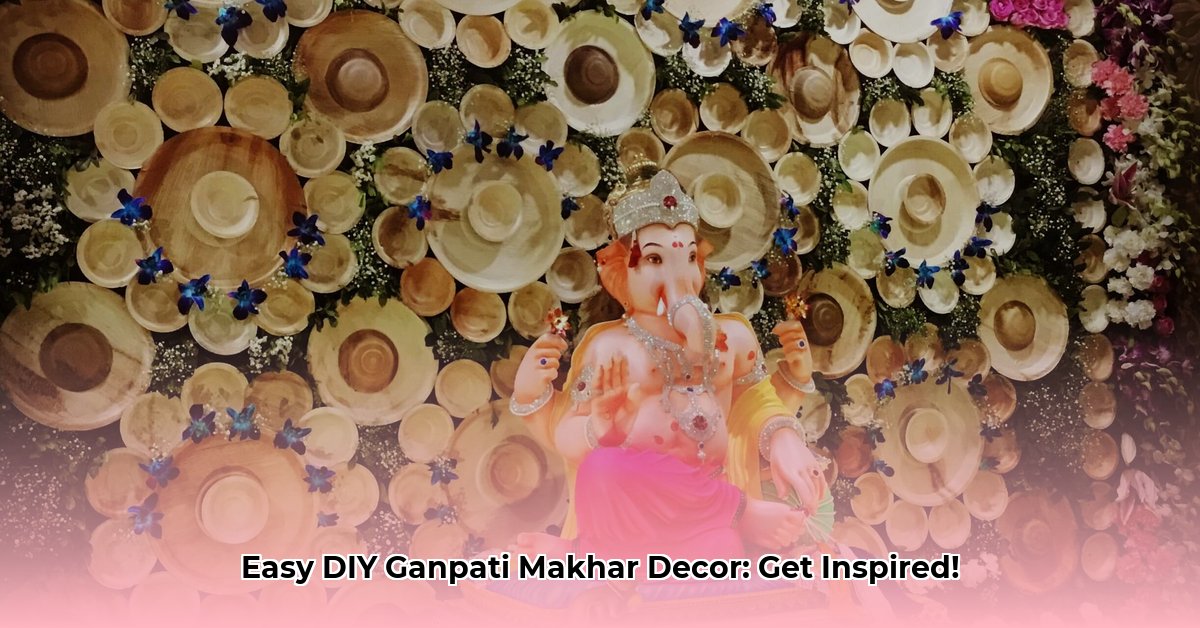Get ready to welcome Lord Ganesha with a beautifully decorated Makhar! This comprehensive guide offers a variety of DIY ideas, from simple to intricate, perfect for both beginners and experienced crafters. Let’s explore different themes and materials to make this Ganesh Chaturthi truly special.
Makhar Magic: Design Ideas to Inspire
Decorating the Makhar is a cherished tradition, symbolizing our devotion and reverence for Lord Ganesha. Let these ideas spark your creativity:
Lightweight & Lovely: Thermocol Creations
Thermocol is an excellent choice for crafting a Makhar. Its lightweight nature and ease of manipulation make it ideal for intricate designs.
Materials:
* Thermocol sheets (various thicknesses)
* Sharp craft knife/hot wire cutter
* Strong adhesive
* Acrylic paints
* Embellishments (mirrors, beads, glitter)
Instructions:
1. Sketch: Lightly sketch your design onto the thermocol.
2. Cut: Carefully cut along the sketched lines. A hot wire cutter is recommended for smoother edges.
3. Assemble: Glue the pieces together, ensuring a sturdy structure.
4. Decorate: Paint and embellish your Makhar.
Floral Fantasy: Fragrant & Festive
Flowers instantly add a touch of natural beauty and fragrance to your Makhar.
Materials:
* Fresh flowers (marigolds, roses, jasmine)
* Floral foam
* Green floral tape
* Decorative wire (optional)
* Makhar base (thermocol, cardboard, tray)
Instructions:
1. Hydrate: Soak the floral foam in water.
2. Secure: Place the foam on your Makhar base.
3. Arrange: Create your floral arrangement, securing stems with tape and wire.
Eco-Friendly Elegance: Paper & Natural Materials
Embrace sustainability with a Makhar made from recycled paper, cardboard, or natural materials like leaves and twigs.
Materials:
* Colored/patterned paper, cardboard, or natural elements (leaves, twigs, etc.)
* Scissors
* Glue
* Biodegradable paints/glitter (optional)
Instructions:
1. Prepare: Cut and shape your chosen materials.
2. Assemble: Glue the elements together, creating your desired design.
3. Decorate: Add biodegradable paints or glitter if desired.
Regal & Rich: Fabric Drapery
Draping rich fabrics like silk or velvet adds a touch of elegance.
Materials:
* Fabric (silk, velvet, brocade, or decorative dupatta)
* Decorative pins/tacks
* Embellishments (beads, tassels, lace)
Instructions:
1. Drape: Carefully drape the fabric over your Makhar base.
2. Secure: Secure the fabric with pins or tacks.
3. Embellish: Add embellishments for a regal touch.
Illuminating Inspiration: LED Lights
LED lights create a magical, festive ambiance.
Materials:
* LED string lights (battery-operated)
* Tape
Instructions:
1. Wrap: Wrap the lights around the Makhar.
2. Secure: Secure with tape, hiding the battery pack.
Choosing the Right Materials
Selecting the right materials is key to creating a stunning Makhar. Consider your desired aesthetic, skill level, and available resources.
| Material | Skill Level | Estimated Time | Budget |
|---|---|---|---|
| Thermocol | Beginner | 2-4 hours | Low |
| Flowers | Beginner | 1-2 hours | Medium |
| Paper/Natural | Beginner | 3-5 hours | Low |
| Fabric | Intermediate | 1-3 hours | Medium |
| LED Lights | Beginner | 30 minutes | Low |
Step-by-Step Eco-Friendly Makhar DIY: Detailed Guide
Creating an eco-friendly Makhar is a beautiful way to honor both Lord Ganesha and Mother Earth. Let’s explore some detailed steps:
1. Banana Leaf Backdrop
Create a vibrant green backdrop using readily-available banana leaves. Secure them with twine or natural fiber string.
2. Floral Decorations
Adorn your Makhar with fresh flowers. Create garlands, scatter petals, or arrange them in beautiful patterns.
3. Upcycled Newspaper Crafts
Transform old newspapers into decorative elements by rolling them into tubes and shaping them into various designs.
4. Eco-Friendly Lighting
Use clay diyas or repurposed glass bottles as lanterns with battery-operated tea lights for a safe and eco-conscious glow.
5. Crafting Ganesha
Consider crafting your Ganesha idol from eco-friendly materials like clay, rice flour, or even plantable seed mixtures.
6. Cardboard Creations
Repurpose cardboard boxes into structural components or intricate backdrops for your Makhar.
Crafting a Traditional Makhar: A Deeper Dive
Traditional Makhars often incorporate natural materials and symbolic designs. Researching historical and regional styles can provide inspiration.
Materials:
Prioritize natural materials like wood, jute, coir, flowers, and leaves. Sourcing them locally adds a meaningful touch.
Design & Styles:
Explore traditional temple architecture, regional variations, and symbolic elements to enrich your Makhar’s design.
Building Your Makhar: A Step-by-Step Approach
- Prepare: Gather and prepare your chosen materials.
- Base: Construct a sturdy base.
- Structure: Build the Makhar structure, following your chosen design.
- Reinforce: Secure all parts and reinforce any weak points.
- Decorate: Adorn your Makhar with flowers, garlands, and other traditional embellishments.
Diagrams, illustrations, and video tutorials can be invaluable resources during the construction process. Consulting with elders or researching traditional Indian art can offer deeper insights.
Remember, crafting a Makhar is a personal expression of devotion. Let your creativity flow and enjoy the process of creating a beautiful and meaningful tribute to Lord Ganesha. While established practices offer guidance, ongoing research in sustainable materials and design suggests that our understanding of eco-friendly practices is constantly evolving. Embrace the opportunity to learn and adapt, celebrating Ganesh Chaturthi in a way that honors tradition and respects our planet.
- Grow Stunning Ribbon Plants: A Complete Guide - May 28, 2025
- Discover Ribbed Glass: Design Guide & Applications - May 28, 2025
- Discover Your Dream Rhinestone Wedding Dress: A Guide - May 28, 2025










